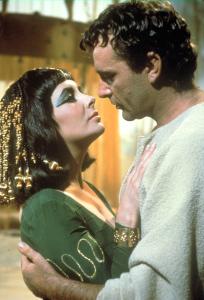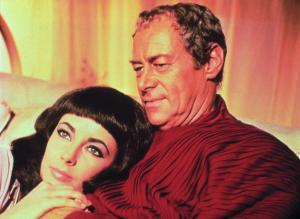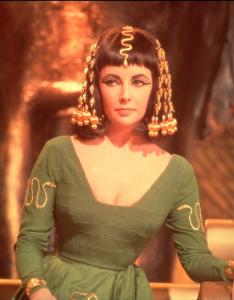************************************************************** EDITOR’s CHOICE May 2002 **************************************************************
DVD Film:
Cleopatra (Special Edition) Music by Alex NORTH
Starring: Elizabeth Taylor, Richard Burton and Rex Harrison. Directed by Joseph L. Mankiewicz
20th Century Fox Home Video 3 DVDs CLEOPATRA SPECIAL EDITION is out to buy on DVD (24.99) and VHS (15.99) from 15th April. [Feature film: 248 mins; Documentary 2hrs approx.]

'Surely the most bizarre piece of entertainment ever to be perpetrated' – Elizabeth Taylor.
'Whatever was interesting about it clearly ended up somewhere else: on the cutting room floor, in various hotel rooms, in the newspaper columns… it lacks not only the intelligent spectacle of Lawrence of Arabia but the spectacular unintelligence of a Cecil B. deMille product…' – John Simon.
'I only came to see the asp' – Charles Addams.
'The small screen does more than justice to this monumental mouse'- Judith Crist
 |
 |
 |
Regular Film Music on the Web readers will recall that the site's reviewers unanimously voted Varèse Sarabande's release of Alex North's Oscar-nominated complete score for Cleopatra as the 'Best Classical film Score' recording of 2001. You can read our reviews again below. Brief mention is made of North's Cleopatra music in the outstanding two-hour documentary, Cleopatra – the film that changed Hollywood (and nearly wrecked 20th Century Fox) that is the main component of the third disc in this lavish package. For this special DVD release, the feature lasts 248 minutes, considerably longer than the truncated 3 hours+ that the 20th Century Fox executives insisted it be cut to, for its initial release. [The documentary appeals for a continued search for up to two more hours of missing film to complete 6-hour production that was producer Walter Wanger's original vision] This new refurbishment has North's Cleopatra music retrieved, restored and remastered – to make up 2˝ hours of score. The result sounds stunning complementing the film's brilliant, lush sets and costumes. The comment is made that North's music is a major achievement in film music, the score being of great complexity – layer on layer - using extraordinary exotic instrumentation, often giving the impression of slithering snakes to suggest the storyline's serpentine plots and counter-plots.
Looking at the film so many years on from its original release in 1963, and all its incumbent sensational publicity (and the unkind notices quoted from Halliwell at the top of this review), one can appreciate the acting and its colour spectacle all the more objectively. Both Elizabeth Taylor and Richard Burton may chew the scenery but their chemistry certainly ignites the screen. Rex Harrison acquits himself well in something of a tailor-made role as Julius Caesar allowing him to flex his well-worn authority with charm routine. [Later he was to win an Oscar for authority without charm as Henry Higgins in My Fair Lady] Roddy McDowell gave the performance of his career as Octavius but was cheated from winning a supporting actor Oscar because of a scandalous clerical error that entered him as a leading actor nominee contender.
An extraordinary epic finely refurbished for DVD release with an absorbing documentary. It is a pity there was so little coverage of the Alex North score
Ian Lace

Here's what we said about the Varèse Sarabande soundtrack album released last year
After breaking new ground with his score to Spartacus just three years earlier, Alex North went even further with Cleopatra, writing music that, particularly in the film's first half, defies Hollywood fashion by conceding the barest minimum to conventional thematic melody. Instead, jagged, clashing rhythms and jabs of percussive dissonance dominate an almost unrelenting succession of cues in this monumental work. This is not easily accessible music. The score is so massive -- 53 cues totalling 151 minutes! -- and meticulous that it defies quick assessment, making what follows more a series of impressions rather than a studied analysis.
One of the score's larger cues is 'Cleopatra's Entry to Rome,' something Rózsa or Newman would have turned into a grand set-piece complete with full orchestral treatment of bold thematic material. North, however, scores it with what sounds like obscure percussion and brass, sounding rather like primitive source music.
Even where the music is more readily accessible - in the overture and opening title theme for Caesar and Cleopatra - North makes it clear that what melody is offered will focus on intimate portraits rather than sprawling grandeur. The overture, for example, is based wholly on North's theme for Cleopatra's ambition, underlining her sensuous, sinister nature, while the Caesar-Cleopatra theme is voiced largely in subdued woodwinds with soft harpsichord punctuation.
It would seem evident from this approach that North was working closely with writer-director Joseph L. Mankiewicz, whose vision of an intimate spectacle is equally apparent from the film's many finely crafted scenes. (See the January 1988 Films in Review for a fascinating account of the director's original intentions in this much-storied production.)
This musical intimacy, first suggested in North's delicate yet detached treatment of Cleopatra's and Caesar's cerebrally and politically based relationship, takes a decidedly warmer turn in the film's second half as Cleopatra and Mark Antony's relationship develops. The musical material for Antony and Cleopatra, naturally, forms the core of the film's second half, examining and illuminating the many layers of the two lovers' tortured relationship. The cue 'Love and Hate' begins softly before dissolving into throbbing string chords as a tearfully raging Cleopatra grabs a knife and repeatedly stabs the bedding she and Antony had shared. As her agony overcomes even her anger, she crumples amid the ripped and torn bedsheets, accompanied by North's music which now becomes -- as described by Mankiewicz in what must be the most literate, insightful liner notes ever penned by a filmmaker -- for all the world a simple lullaby, gently soothing the sobbing queen.
But it's North's use of brass and percussion that especially stand out - at least on an initial listening.
Caesar's assassination, which is depicted from Cleopatra's perspective, opens softly with the Caesar-Cleopatra theme, after which North introduces ominous stirrings as the plotters close in, finally erupting in a maelstrom of shrieking brass. (North has referred to this scene as among the best-scored of his career.)
'Sea Battle' -- at 14 minutes, the score's longest cue -- is a small masterpiece unto itself, not least for North's conducting. Generals are sometimes described as directing their battles like conductors; here, the simile can be turned around: North marshals his brass and percussion like a general directing a great field battle. (And it's here, by the way, that the composer allows himself one of his few quotations from the earlier Spartacus.)
Also worthy of special attention is the cue 'Grant Me an Honorable Way to Die,"in which North's brass echoes the frustration of Antony, his troops having deserted him, as he flings himself repeatedly against Octavian's troops who refuse to strike back. Again, from the LP liner notes, Mankiewicz' own description is best: "The muted trumpets scream, in Antony's name, an anguish which cannot be written, in a voice no actor can project."' (My only quibble with Jeff Bond's exhaustive and otherwise excellent notes is the failure to include at least some part of Mankiewicz' original notes.)
Shortly after this score became available, thanks mainly to the efforts of Varese Sarabande's Robert Townson and producer Nick Redman, Film Score Monthly's Lukas Kendall - who also had a hand in its production - voiced frustration at what he perceived to be a lack of public response. The reason, he speculated, might well be North's musical style which, as already noted, defies quick or easy appreciation. The ensuing discussion has been spirited, to say the least, including testy comments from Townson.
Not to worry, ladies and gentlemen: If my own experience in learning to appreciate North is any example, it's just a matter of time. I can still recall, as a teenager, getting the soundtrack album to Spartacus. I'd already been introduced to Tiomkin, Rózsa and Jarre, so this one looked like a natural. I put the record on the turntable - and then listened, dumbfounded, to nearly 40 minutes of the most obscure music (well, save for that love theme) I'd ever heard. One more listen confirmed my initial impressions and the album went on the shelf. Several years later, I picked it up on a whim and gave it another listen -- and was shocked to discover how good a composer Alex North had become!
So just be patient, everyone. "Cleopatra"is an acquired taste, and thanks to these gentlemen, now we can acquire it!
John Huether

Ian Lace also urges you to acquire this album:-
I heartily agree with everything that John says in his adroit review above. I hasten to add that there is much that can be enjoyed at a first hearing. (Although I would agree that more and more riches are revealed on repeated hearings.) This is a complex, densely textured score, very richly orchestrated. For the most part there is always something to arrest and interest the ear. It is a score that works supremely well with the on-screen images. Occasionally it is quite surprising. Take for instance the syncopated figures in 'Moon Gate'.
One admires the cleverness of communicating, simultaneously, so much atmosphere and diversity. Take for instance, 'Cleopatra Enters Rome', you not only sense the grandeur and excitement of the occasion, but you also feel that the slow sinuous swaying figures paralleling the progress of Cleopatra's enormously imposing 'train', is not so subtly mocking the pride of the great Roman empire. Balancing the trumpetings and drum beats that herald the might of Rome, are the sensuous rhythms associated with Egypt, employing a rich diversity of percussion: intriguing and glittering in 'A Gift for Caesar' sinister and sinuous in 'A Taste of Death', voluptuous in 'Cleopatra's Barge' and hedonistic in 'Bacchus'.
I have to say that the least interesting facet of North's talent is his romantic music. For the most part, like Herrmann (Vertigo excepting), he does not seem to be able to write a memorable romantic theme. Although his love music works admirably in the film, one is not (at least this reviewer isn't) sufficiently moved by it divorced from the on-screen images. There is too much reliance on high string 'sweet nothings'. I therefore found some 8 minutes of this material, spread over two or three consecutive cues on CD 2, tedious. But this is a minor carp in the context of a fascinating 2˝ hours of masterly screen scoring. Unhesitatingly recommended
Ian Lace

Return to Index